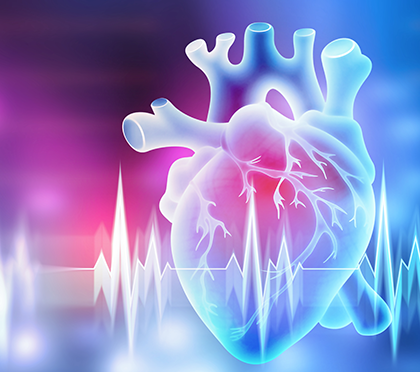How to prepare for a visit to the Cardiologist near me
How to prepare for a visit to the Cardiologist near me
Blog Article
Recognizing the Importance of Cardiology in Modern Medical Care Providers
Cardiology plays a vital role in contemporary healthcare, especially as cardiovascular disease continues to be the leading root cause of death worldwide. Advances in diagnostics and therapy have actually changed person treatment, enabling earlier treatments and improved end results. Furthermore, the shift towards preventative cardiology empowers individuals to manage their wellness proactively. As technology remains to advance, the integration of innovative options might better redefine cardiology's influence on public health and wellness, motivating a closer evaluation of arising patterns and their implications.
The Frequency of Cardiovascular Disease and Its Influence On Public Wellness
Although cardiovascular disease remains the leading cause of death globally, its effect prolongs much beyond private people to influence public health and wellness systems and economic situations. The high frequency of heart problem positions a substantial pressure on health care resources, demanding raised funding for rehabilitation, avoidance, and therapy programs. Public wellness efforts need to deal with threat aspects such as obesity, smoking, and sedentary lifestyles, which contribute substantially to the climbing incidence of heart conditions.Moreover, the economic concern linked with cardiovascular disease is immense, incorporating not only straight medical prices but likewise indirect expenditures connected to lost productivity and premature death. Neighborhoods face obstacles in managing these expenses, typically bring about disparities in health care accessibility and end results. As the population ages and lifestyle-related dangers remain to escalate, the necessity for effective cardiology treatments ends up being vital. Subsequently, resolving heart illness is not just an issue of individual wellness yet also a critical public health top priority.
Breakthroughs in Cardiac Diagnostics and Imaging Techniques
Recent innovations in heart diagnostics and imaging techniques have reinvented the field of cardiology, improving the capacity to spot and keep track of heart problem. Techniques such as heart MRI, CT angiography, and echocardiography have ended up being progressively advanced, offering in-depth photos of heart frameworks and features. These methods permit the very early identification of conditions like coronary artery illness, heart failure, and valvular disorders.Moreover, innovations in non-invasive diagnostics, such as wearable innovation and remote surveillance gadgets, have actually empowered clients and medical care suppliers. These tools assist in real-time monitoring of heart rhythms and other important signs, resulting in timely treatments. Furthermore, artificial intelligence is being integrated into imaging evaluation, enhancing precision and effectiveness in diagnosis.
Innovations in Therapy Options for Heart Issues
Current advancements in cardiology have caused substantial technologies in therapy choices for heart conditions. These include sophisticated surgical techniques that improve step-by-step results and arising medications that use new avenues for treatment. As the area develops, these advancements play an important duty in enhancing individual care and results.
Advanced Surgical Techniques
Developments in surgical strategies have actually transformed the landscape of cardiology, providing brand-new hope for clients with heart problems. Minimally invasive treatments, such as catheter-based interventions, have greatly decreased recuperation times and health center remains. Methods like robotic-assisted surgical treatment enhance accuracy, allowing surgeons to browse complicated anatomical structures with better accuracy. Developments in imaging modern technology promote real-time visualization throughout treatments, boosting results. Transcatheter aortic shutoff replacement (TAVR) exemplifies a development in dealing with aortic constriction, enabling valve replacement without open-heart surgical treatment. In addition, hybrid techniques that incorporate catheter-based and surgical methods offer tailored remedies for numerous heart problems. These innovative surgical strategies not only boost person safety and security yet additionally expand therapy alternatives, underscoring the essential duty of innovation in modern cardiology practices.
Arising Therapies and drugs
As the landscape of cardiology remains to evolve, emerging medicines and therapies play a crucial role in boosting therapy options for heart conditions. Innovations such as unique anticoagulants and progressed lipid-lowering agents have actually transformed the management of heart diseases, substantially lowering patient morbidity and death. In addition, the growth of genetics therapies and regenerative medication supplies encouraging avenues for treating problems formerly regarded irreversible. Professional trials are continually revealing the efficacy of these therapies, pressing the borders of traditional therapies. The assimilation of electronic health and wellness modern technologies assists in tailored medicine, permitting for customized treatment strategies based on hereditary and way of life aspects. Jointly, these innovations highlight the vibrant nature of cardiology, enhancing individual outcomes and redefining requirements of treatment in contemporary medical care.
The Role of Preventive Cardiology in Individual Treatment
Preventative cardiology plays an important function in individual treatment by concentrating on the recognition of risk factors that add to heart disease. With way of life adjustment techniques and very early detection strategies, doctor can effectively reduce the occurrence of cardiovascular occasions - Cardiologist near me. This positive method not just boosts person results however likewise promotes long-lasting wellness
Risk Variable Recognition
While cardio conditions continue to be a leading reason of morbidity and death worldwide, effective threat aspect identification functions as a keystone of preventive cardiology. Identifying threat variables such as high blood pressure, household, hyperlipidemia, and diabetes mellitus background is important for early intervention. Medical care experts make use of numerous screening methods to evaluate these elements, permitting tailored safety nets. In addition, recognizing a client's lifestyle choices, such as smoking and physical inactivity, even more educates danger evaluations. This comprehensive analysis makes it possible for clinicians to establish individualized treatment strategies focused on mitigating risks. By focusing on danger variable recognition, healthcare systems can boost person results and decrease the general burden of cardio conditions, inevitably contributing to boosted public health approaches and source allotment.
Way Of Life Modification Techniques
A wide range of researches highlights the critical duty of way of life adjustment strategies in decreasing heart disease danger. These strategies incorporate dietary adjustments, raised exercise, cigarette smoking cessation, and weight monitoring. By adopting a heart-healthy diet plan rich in fruits, veggies, entire grains, and lean healthy proteins, people can decrease cholesterol degrees and blood stress. Normal physical task reinforces the heart and improves total cardio wellness. Furthermore, stopping cigarette smoking greatly minimizes the threat of heart condition and enhances recuperation prices for those with status quo. Weight administration additionally contributes to cardio health and wellness by minimizing various other danger factors such as diabetes mellitus and high blood pressure. Applying these way of life alters not only promotes specific health yet also acts as a keystone of precautionary cardiology in individual treatment.
Early Discovery Strategies
Way of life modifications greatly add to minimizing heart disease risks, yet they are most efficient when paired with very early detection techniques. Preventative cardiology highlights the significance of determining potential heart concerns before they rise into serious problems. Techniques such as blood pressure surveillance, cholesterol screening, and progressed imaging innovations like echocardiograms play essential duties in examining cardio health and wellness. Biomarkers and hereditary testing additionally enhance the accuracy of early discovery, permitting tailored preventative techniques. Normal cardiac danger analyses equip medical care companies to interfere proactively, potentially stopping cardiac arrest and strokes (Cardiology Jupiter). By incorporating these very early detection techniques right into regular care, individuals can take advantage of timely way of life treatments and targeted therapies, ultimately enhancing end results and boosting top quality of life
Integrating Technology Into Cardiology Practices
As developments in innovation remain to improve various fields, the integration of ingenious devices and systems right into cardiology practices has ended up being necessary for boosting person treatment and outcomes. Telemedicine platforms permit cardiologists to keep track of clients remotely, enhancing accessibility to care while minimizing the worry on medical care centers. Wearable tools, such as smartwatches, make it possible for continual heart price surveillance, signaling both people and medical professionals to possible concerns in real-time. In addition, expert system (AI) is being made use of to examine huge amounts of cardiac information, assisting in early medical diagnosis and news tailored therapy strategies. Advanced imaging methods, consisting of 3D echocardiography, enhance visualization of heart frameworks, resulting in a lot more exact treatments. Digital health and wellness records (EHRs) improve patient details monitoring, ensuring that cardiologists have immediate accessibility to vital data. Together, these technical improvements are transforming cardiology, advertising positive management and improved wellness outcomes for clients with cardiovascular problems.
The Relevance of Individual Education and Interaction
Individual education and involvement play a critical duty in the management of cardio health. By furnishing patients with understanding concerning their conditions, treatment alternatives, and lifestyle modifications, healthcare companies encourage individuals to take an active duty in their treatment. This proactive technique can bring about improved adherence to recommended drugs, nutritional changes, and exercise programs, inevitably reducing the risk of complications.Engagement likewise cultivates a solid patient-provider relationship, encouraging open communication and depend on. When people really feel informed and involved, they are most likely to voice worries and ask inquiries, which can bring about better clinical outcomes. Furthermore, academic resources, such as workshops or digital platforms, can improve understanding and promote self-management methods. Generally, focusing on individual education and learning and involvement is crucial for boosting cardio wellness, boosting top quality of life, and lowering medical care expenses connected with cardiovascular illness.
Future Trends in Cardiology and Their Potential Impact

Frequently Asked Concerns
What Way Of Life Adjustments Can Minimize Heart Illness Risk?
The current inquiry addresses way of living modifications that can significantly reduce cardiovascular disease threat. Cardiology. Embracing a balanced diet regimen, engaging in regular exercise, preserving a healthy and balanced weight, taking care of anxiety, and preventing cigarette can significantly improve cardio health
Just How Can I Acknowledge Very Early Indications of Heart Problems?
Acknowledging early indications of heart problems includes monitoring signs such as chest discomfort, shortness of breath, tiredness, and uneven heartbeat. Prompt awareness of these signs can prompt needed clinical assessment and treatment for better end results.
What Are the Differences Between Cardiologists and Heart Surgeons?
The differences between cardiologists and heart surgeons depend on their duties; cardiologists mainly identify and manage heart problems through non-invasive techniques, while heart surgeons do procedures to fix architectural heart concerns. Each plays a vital, unique function.

How Often Should I Obtain My Heart Wellness Checked?
The frequency of heart medical examination differs based upon private risk variables. Typically, grownups should undergo examinations each to 2 years, while those with status quo Full Article may require more regular evaluations as recommended by healthcare professionals.
What Function Does Genes Play in Heart Illness Danger?
Genetics substantially influences heart problem danger, with familial patterns showing inherited problems. Particular genetics can predispose people to hypertension, cholesterol problems, and other cardio issues, highlighting the importance of genetic testing in assessing heart wellness. Heart illness continues to be the leading cause of fatality worldwide, its influence extends far past private clients to affect public wellness systems and economies. Public health and wellness campaigns should resolve risk aspects such as obesity, cigarette smoking, and less active lifestyles, which contribute considerably to the rising occurrence of heart conditions.Moreover, the economic worry linked with heart illness is enormous, encompassing not just straight clinical prices however likewise indirect expenditures connected to lost productivity and premature death. Preventive cardiology plays an important function in person care by concentrating on the identification of threat elements that contribute to heart illness. Man-made knowledge (AI) and maker understanding are improving diagnostics and client surveillance, allowing very early detection of heart conditions. The distinctions in between cardiologists and cardiac surgeons lie in their roles; cardiologists mostly take care of and identify heart problems via non-invasive approaches, while heart doctors execute surgical treatments to remedy structural heart concerns.
Report this page